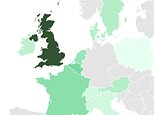
Parts of Europe have seen a 700% rise in baby boys being named Muhammad or another variation since the Millennium.
One in 200 boys born in Austria today will be called either Muhammad, Mohammed, Mohammad, Mohamed and Mohamad, official statistics suggest.
For comparison, Daily Mail analysis shows the equivalent rate stood at around one in every 1,670 in 2000.
In England and Wales last year, 3% of boys were given the name Muhammad or one of four separate iterations ubiquitous in Islamic culture. Yet in parts of the nation this was as high as 9%, separate figures suggested.
Many Muslims of Pakistani, Bangladeshi or Indian heritage regard it as a blessing to give a baby the name of the prophet, the founder of Islam.
Growing sizes of Muslim communities across the UK fuelled by immigration, as well as the popularity of sporting figures such as Mohamed Salah are likely to be behind the increase, experts say.
The Daily Mail audit involved trawling official baby naming figures from 11 European countries.
Datasets for some, including Germany – which has seen the most Muslim refugees arrive in the last decade – were not publicly accessible in full.
Due to the many spelling variations and their varying popularity in each country, our audit combined the five most common spellings into one grouping.
Behind England and Wales, the nation with the highest rate was Belgium.
There, just over 1% of boys born in 2024 were given one of the five names – up from 0.5% in 2000.
Similarly high figures were seen in France (0.87%) and the Netherlands (0.7%).
Meanwhile, the rate in some countries stayed relatively static, while others saw a decline in the prevalence in recent years.
However, given there are thirty-plus ways to spell the name, it’s likely the Daily Mail’s analysis underrepresents the true figure.
Research from the influential Pew Research Centre estimated that Muslims made up 4.9% of Europe’s total population in 2017.
Yet this would double to 11.2% by 2025 if migration continued at a ‘medium’ level, its projections showed.
It said in its report: ‘In recent years, Europe’s experienced a record influx of asylum seekers fleeing conflicts in Syria and other predominantly Muslim countries.
‘This wave of Muslim migrants has prompted debate about immigration and security policies in numerous countries and has raised questions about the current and future number of Muslims in Europe.’
Robert Bates, of the Centre for Migration Control, said: ‘Europe has seen a rapid uptick in migration from the Islamic world as families and whole communities have moved westward to benefit from Europe’s greater relative prosperity and stability.’
Across all 11 countries in our audit, Poland had the fewest number of baby boys called Muhammad or one of the other spellings (0.01%) in 2024.
Polish governments have fought bitterly against EU migration plans over the years.
Mateusz Morawiecki, who served as Poland’s prime minister from 2017 to 2023, said when he left office that he didn’t want Polish culture to be ‘destroyed by the Muslim migrants coming from the Middle East or from Africa’.
An investigation into baby names by the Economist earlier this year found that in the past, migrants often felt pressure to discard names that sounded too foreign, but as Europe becomes more diverse, the range of names has grown broader.
Instead of changing names, today many parents proudly select a name that preserves their cultural identity, seeing it as a statement of belonging rather than a barrier to integration.
Figures from the Office for National Statistics (ONS) last month revealed that the top boys’ name in 2024 was Muhammad, for the second year running.
Some 5,721 boys were given the specific spelling of Muhammad in 2024, a rise of 23 per cent on the previous year.
Mohammed, a different spelling, first entered the top 100 boys’ names for England and Wales 100 years ago, debuting at 91st in 1924.
Its prevalence dropped considerably in the lead up to and during WW2 but began to rise in the 1960s.
That particular iteration of the name was the only one to appear in the ONS’ top 100 data from 1924 until Mohammad joined in the early 1980s.
Muhammad, now the most popular of the trio in the UK, first broke into the top 100 in the mid-1980s and has seen the fastest growth of all three iterations since.
The name means praiseworthy’ or ‘commendable’ and stems from the Arabic word ‘hamad’, meaning ‘to praise’.
Alp Mehmet, of Migrationwatch UK, said: ‘This is not a surprise given the pace at which the Muslim population has grown. It more than doubled in 20 years.
‘According to the census it went from just over 1.5 million in 2001 to just under 4 million in 2021. It is still growing. So, expect Muhammad to stay at the top of the pile for years to come.’
But the ONS, alongside most other European statistical bodies, only provide figures based on the exact spelling and do not group names.
If multiple spellings were grouped under one umbrella name, Theodore (8th in 2024, 2,761 and Theo (12th in 2024, 2,387) would have ranked above Noah (second-place 2024 name).
Therefore, because five spellings of Muhammad have been used for this data set, it has an advantage over other names.
The different backgrounds of Muslims around the world partly explain the variation in spelling.
For instance, the transliteration of the name from South Asian languages is more likely to yield Mohammed, whereas Muhammad is a closer transliteration of formal Arabic.











